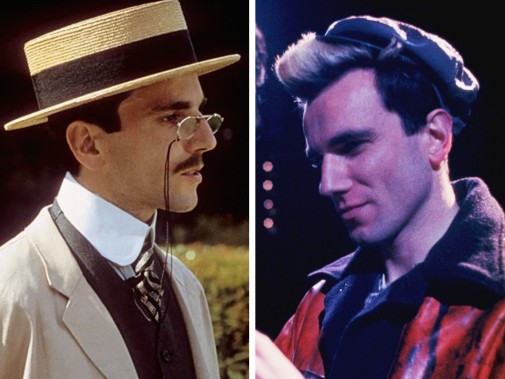
Some years are especially momentous in an actor's career. A few days ago, I wrote about Adam Driver's promising 2021, how a collection of ambitious projects might make the performer essential to any overview of the cinematic year. A similar situation happened in 1986 when Daniel Day-Lewis first came to prominence for worldwide audiences. While he had had small roles in a couple of films in the early eighties, it was the international release of a remarkable pair of features that put his name on the map. It happened all at once, and, for New Yorker filmgoers, in particular, it was staggeringly sudden. On March 7th, 1986, NYC was blessed with the premiere of two pictures featuring two incredibly different performances by the same (then) little-known Irish actor. To this day, A Room with a View and My Beautiful Laundrette represent some of Daniel Day-Lewis' most excellent work…
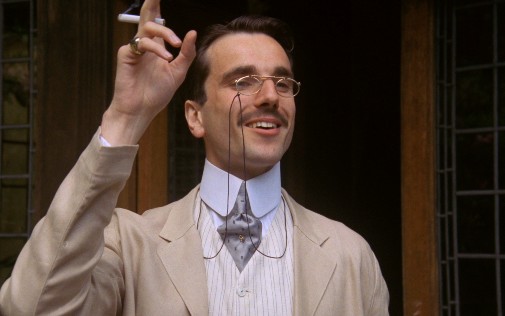
Here at The Film Experience, we have discussed Merchant-ivory's A Room with a View into exhaustion. Still, since my part of that movie's deep-dive only concerned its Florentine first act, I didn't get an opportunity to explore the merits of Daniel Day-Lewis' take on E.M. Forster's Cecil Vyse. So forgive this return to Edwardian England, but one feels the need to gush a bit. While relatively polarizing, this is one of my favorite performances of his. It's also one of the few instances when the actor explored his comedic capabilities, unraveling a tapestry of arch mannerism married to a lofty sense of aristocratic snobbery. Cecil is desperately pretentious, so aloof as to be ignorant of his own emotions and of how ridiculous he sounds to those around him.
The faults of the character aren't necessarily reflective of its actor. Indeed, Day-Lewis shows a remarkable clarity of purpose when playing Cecil, using every exaggerated gesture as parodical punctuation of English good manners and repressive sentiment. One can't help but be annoyed or laugh at him. In that respect, the spectator is quickly drawn to identify with the Honeychurches, Cecil's would-be in-laws. Nevertheless, underneath this brittle ballet of obnoxious affectation, both actor and text are setting the stage for a subtle character arc that ends on unexpected devastation. In that sense, he's very much like the Oscar-nominated Maggie Smith, who presents her Charlotte Bartlett as an irritating spinster before letting us in on the woman's inner depths.
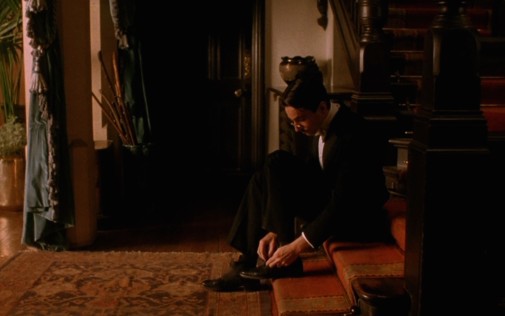
For Day-Lewis, this manifests in hints of swallowed hurt, some indignancy that's quickly covered by the flash of a fake smile, an over-articulated Italian term, or some unfortunate joke that no one else finds amusing. These morsels of insecurity build up until the actor's last couple of scenes when Cecil must face rejection, the ache of disappointment festering into paralyzing self-doubt. The rigidity of the thespian's body language gains new meaning when he awkwardly tries to keep up appearances, tries to be polite to the woman that just destroyed him. Sitting on the bottom steps of a stairway, fiddling with his shoes in the lonesomeness of a sad night, Daniel Day-Lewis manages to convey incredible sorrow with very little in the way of actorly tricks.
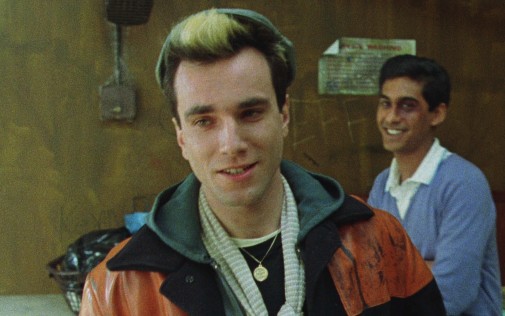
Stephen Frears' My Beautiful Laundrette asks the actor to do a similar feat, revealing a character's interiority despite the role's specificities requiring a smokescreen of posturing and invulnerability. However, the character types couldn't be more antithetical. While Cecil Vyse is an Edwardian snob molded by stultifying privilege, Johnny is a low-class hooligan and erstwhile skinhead who prefers to keep quiet and to himself. James Ivory guided the actor through a showy turn, but Frears demands a more subdued approach, defined by silence rather than a barrage of posh nonsense. Cecil is always trying to ingratiate himself but Johnny is closed-off and unwilling to ask for attention.
At least, we get the sense he was once like that. While one could easily describe Johnny as My Beautiful Laundrette's co-protagonist, he's never Frears' sole subject. Depicting a country under Thatcherism, the British director created a transgressive jewel that posits a family's economic ambitions as a product and an indictment of their society. The protagonist Omar (Gordon Wanecke) is the child of Pakistani immigrants, his father a left-leaning journalist gone to seed through alcoholism. Contemplating the financial power of his more affluent, openly capitalistic relatives, the young man dreams of making big money. Taking advantage of his uncle's guilt-induced generosity, he convinces the older man to let him manage a laundrette.
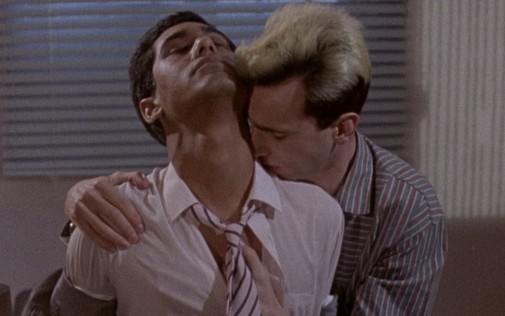
That's where Johnny comes in. After encountering this old schoolmate on the streets one night, Omar hires him. Johnny's previous fascistic ideations and ethnicity define him as an unlikely subordinate, but the two of them make it work. Moreover, love blossoms between them, their mutinous camaraderie giving way to tentative intimacy, mutual care, tenderness. Arriving at an unexpected juncture, Hanif Kureishi's Oscar-nominated screenplay asks us to consider a shift in power dynamics between the two men, something they willingly perpetuate, not entirely ignorant of their attachment's political symbolism. It's a complicated narrative, intent on exploring a multiplicity of intersectional themes within a social realist milieu.
With that description in mind, it's easy to picture a novice screen actor mistaking ideological subtext for character building blocks. Day-Lewis, however, brings ideas to Johnny that neither screenplay nor direction provides, making him much more than the cipher-like concept he might have become. Re-watching My Beautiful Laundrette this time around, I was especially delighted by how more upfront the actor is regarding the character's queerness and how that complicates the porous membrane between eroticism and romantic ties. Much more than Frears, Day-Lewis comes off as an eager depicter of gay horniness, instilling a burst of carnality into the most inane interactions. Notice how he licks Omar on the street, a naughty grin on the corner of his mouth.
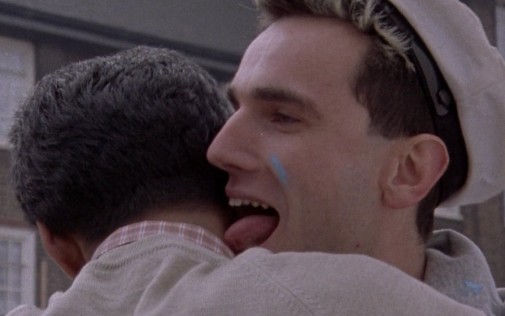
Johnny's forwardness isn't the whole story. In less upbeat passages, those lost moments spent alone in the shadows of domestic privacy, Day-Lewis reveals surprising gentleness in how Johnny relates to his lover. Sometimes, we see him offering comfort to a stressed-out Omar, unrequested touches that speak of a need for demonstrative love. Later on, the situation is reversed, with Day-Lewis as the tense one, all averting eyes and squared-off shoulders. Then, his silence gains an upsetting intensity, as Johnny refuses to ask for the emotional support he wants and needs. When the silent request is answered, a mellowed contentment shades the actor's sculpted distress. It's a minor note that makes all the difference, redefining the film's thematic symphony and making it better, more profound than it would otherwise have been.
1986 audiences were clearly impressed. After watching these two movies back-to-back, who wouldn't become a Daniel Day-Lewis fan?
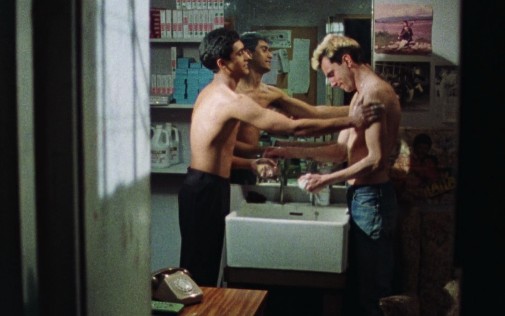
You can stream A Room With a View on the Criterion Channel and HBOMax. My Beautiful Laundrette is streaming on Amazon Prime.